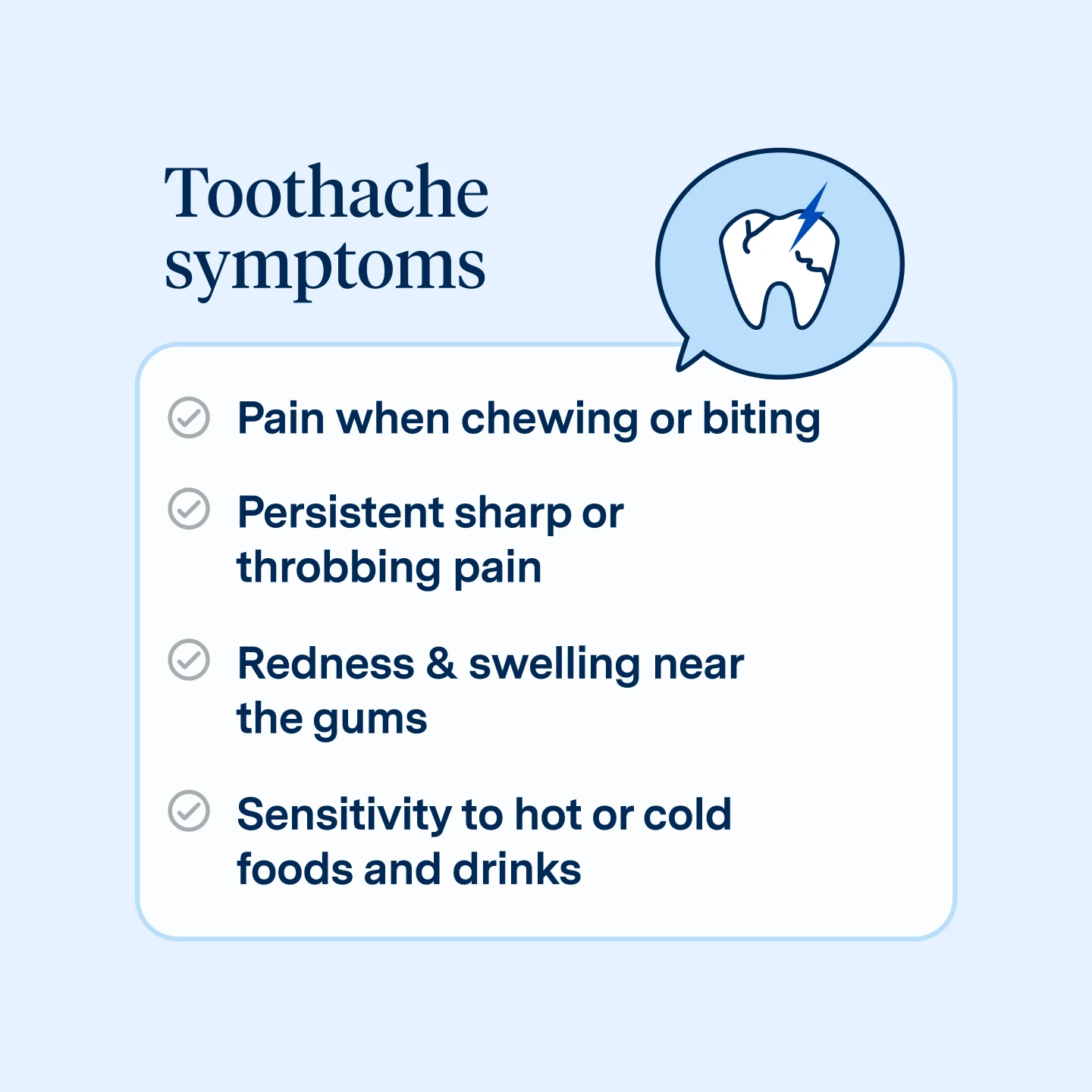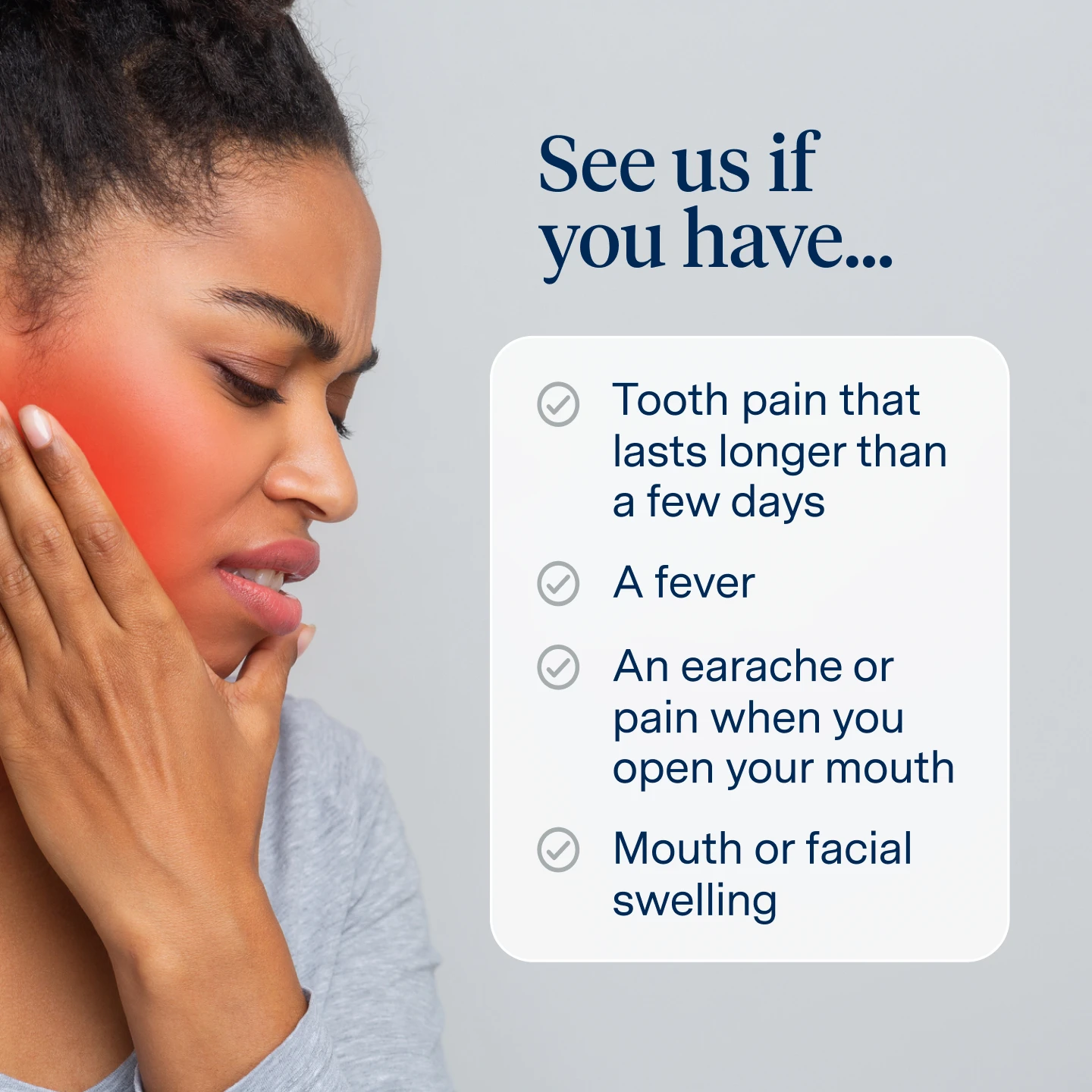Toothache
Got a toothache? Getting rid of it is likely your main priority right now. Toothache pain can range from mild to severe, depending on the cause. It’s important to contact your local Aspen Dental at the first sign of a toothache.

Toothache symptoms
Your toothache symptoms may come on acutely, gradually or even flare up when eating and drinking. Depending on the severity, a toothache can significantly impact your daily activities, including eating, speaking and even sleeping.
If you’re experiencing any of these common toothache symptoms, see your Aspen Dental dentist right away.
Toothache causes
So, you’re experiencing toothache symptoms—but what could be causing them? Let’s talk about it, and most importantly, how to get relief fast.
Tooth abscess
These are dangerous and require and emergency visit to your local Aspen Dental. A tooth abscess is a pocket of pus (infection). These are caused by bacteria that invades your teeth through a deep cavity, crack or gum line. An abscessed tooth won’t heal on its own and putting off care could cost you the tooth—or infection can spread and become life threatening.
Tooth decay
If your pain gets worse when you chew, or when eating or drinking something hot or cold, you might have a cavity. Tooth decay gets worse without intervention, so it’s important to contact your local care team.
Bruxism (teeth grinding)
If the decay has caused significant damage, a dental crown may be needed. A crown is a custom-made cap that covers the entire visible portion of the tooth. It provides protection, restores strength and improves the tooth’s appearance.
Sinus infection
If your toothache is accompanied by congestion and sinus pressure, your tooth might not be the problem at all. Treat the symptoms of your sinus infection first and see if your tooth pain goes away.
Toothache relief
Quick tips for soothing discomfort
You may be able to treat your toothache symptoms at home, or at least get some temporary relief before you see your Aspen Dental dentist.
Here are some things you can try:
Rinse with warm saltwater
Over-the-counter pain relievers
Cold compress
Clove oil
Avoid trigger foods
Brush and floss
Over-the-counter night guard
Toothache remedies and treatment options
If your toothache pain can’t be relieved at home, contact your Aspen Dental care team so they can determine the cause and treat it right away. Here’s what you can expect at your appointment.
Diagnosis
Your dentist will begin by examining the affected tooth and surrounding area. X-rays may be taken to pinpoint the cause of the toothache and provide a proper diagnosis.
Professional cleaning
In some cases, toothaches are linked to gum inflammation. A thorough dental cleaning can help remove plaque and tartar buildup, reducing irritation and alleviating your tooth pain.
Restorative procedures
If the tooth is damaged due to a cavity or getting chipped, restorative procedures like dental fillings or crowns may be performed to restore its structure and function. If the tooth damage reaches the pulp (innermost part of the tooth), then root canal therapy with be necessary to alleviate your tooth pain.
Extraction (if necessary)
If the tooth is severely infected or damaged beyond repair, the dentist may recommend tooth extraction. Although losing a tooth can be scary, the dentist will discuss replacement options, such as dental implants, bridges or dental prosthetics.

When you should seek immediate toothache treatment
Contact your local Aspen Dental right away if you are experiencing a severe toothache. Severe toothaches generally result from deep cavities or severe gum disease, in which case more extensive procedures may be needed (such as root canal or extraction). Waiting to contact us could lead to severe symptoms such as:
Toothache FAQs
How to get rid of toothache
You may be able to find temporary relief at home. Rinse your mouth with warm saltwater to reduce inflammation. Over-the-counter pain relievers can help manage the pain. Press a cold compress to the outside of your cheek to numb the area. Using clove oil or a benzocaine ointment on the affected tooth may help.
When should I see a dentist for a toothache?
If you experience persistent or severe pain in the tooth, it’s crucial to see a dentist promptly to diagnose the underlying issue and receive the appropriate treatment.
Can a sinus infection cause a toothache?
Yes, a sinus infection can lead to referred pain in the upper teeth due to the proximity of sinus cavities to the tooth roots.
Why is my child experiencing toothache?
Children may experience mild to moderate pain during the eruption of a new tooth. This discomfort is a normal part of the tooth development process. The pressure from the emerging tooth as it breaks through the gum tissue can cause temporary irritation, gum sensitivity or the desire to chew on objects. If your child already has their teeth grown in, be sure to look in their mouth to check if you can see visible dark spots or white chalky spots as signs of cavities. Good oral hygiene with brushing and flossing is just as important for baby teeth as it is for adult teeth.
Discover more for your smile
Treat your toothache today
We’re here to answer your questions and provide treatment for your toothache if necessary. Regular visits to your Aspen Dental care team can address the underlying cause of your toothache and prevent further problems. If you’re experiencing pain, make an appointment with us today.
